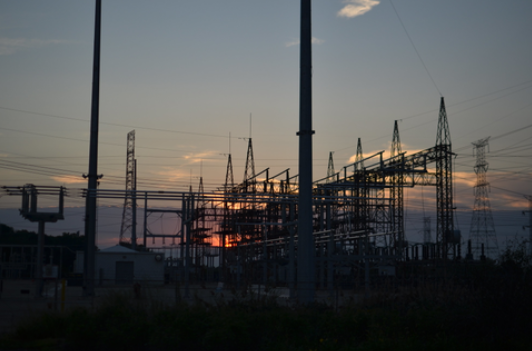Business
For a robust grid of the future, India needs a mix of green tech

New Delhi, July 11
India is undergoing a significant transition in its energy sector, with a growing focus on renewable energy sources. As the country aims to achieve its target of 50 per cent of its energy demand from non-fossil fuel sources by 2030, ensuring grid stability becomes crucial.
One of the key challenges in integrating renewable energy into the grid is the need for a combination of dispatchable power and intermittent renewable energy sources. While renewable energy sources like solar and wind are essential for reducing carbon emissions, their intermittent nature can create imbalances between generation and demand. This transition requires substantial investments in the grid and power supply infrastructure to accommodate the increasing electricity demand and the intermittent nature of renewable energy sources.
In a recent episode of The India Energy Hour Podcast, the hosts Sandeep Pai and Shreya Jai spoke to Srivatsan Iyer, Global CEO at Hero Future Energies, on enhancing grid stability in India.
Iyer mentioned plans for a dedicated renewable energy management centre and better forecasting and planning.
He said, “Minute by minute or day ahead forecasting is still as much art as it is science. So we can't depend on improvements in forecasting and scheduling alone. We have to have mechanisms that allow for grid stability at the aggregate level.â€
Iyer also highlighted the potential of technologies like battery storage and pumped hydro to provide grid stability and competitive power.
Iyer predicted that India is soon going to have large battery storage systems similar to the UK, saying, “I don't think India is too far behind when large battery storage projects will start to provide ancillary services to the grid as well, in terms of voltage or frequency regulation and so on. I think those days are coming.â€
Urging the need for incentives to reduce the overall power consumption in the country, Iyer said: “Today as consumers, whether I'm industrial or sitting at home, I have no incentive to reduce my power consumption any time of the day, right? For me, I'm indifferent, right? When you start getting time of day, people are going to be a little more wary in terms of, When do I charge my car? When do I charge my phone? When do I turn on the appliances and so on?
"Because peak power really is a way to also moderate demand, right? And make people a little more careful in terms of how much power they consume, which brings down the demand at peak hours and moderates it a little more across the day as well. So if India evolves in that direction, then you'll start to see a little more moderation in that as well.â€
Implementing time of day electricity rates in India can incentivise consumers to moderate their demand during peak hours by offering lower tariffs during off-peak hours. This pricing model would benefit renewables as for instance solar hours would be priced lower than say coal. It would be beneficial for the entire energy sector and grid stability as well.
While talking about the energy demand in the country, he said, “The projection of the overall energy demand is actually quite robust. We are going to be consuming a whole lot of energy going forward. So the grid has to keep up with growing demand, regardless of whether the power is coming from thermal or renewable sources.â€
He also mentioned the need for having a roadmap which focuses on investing in grid expansion and stability by the power ministry which will help in moderating the impact of intermittent renewable sources. And energy storage is seen as a crucial solution to mitigate the impact of this intermittency and ensure a stable and reliable power supply.
Furthermore, the episode highlighted the shift towards diversification in renewable energy companies in India. Major players in the industry are expanding their operations beyond solar and wind energy and venturing into manufacturing, batteries, transmission, and other aspects of the supply chain. This shift is driven by the commoditisation of the renewable energy sector and the search for new opportunities with higher margins.
(This is an expert from an episode of the India Energy Hour. Tune into the podcast for more conversations on India's green energy sector. Available on all major podcast platforms and the TIEH website)

1 minute ago
Trump shifts tone on Ukraine, says Kyiv can ‘fight and win’ back territory

2 minutes ago
Trump meets Arab leaders, including Pakistan, in bid to end war in Gaza

5 minutes ago
Jury finds man guilty of attempting to assassinate Trump on golf course

7 minutes ago
US State Department confirms policy of 'complete' denuclearisation of North Korea

8 minutes ago
EAM Jaishankar holds series of bilateral interactions on UNGA sidelines

9 minutes ago
EAM Jaishankar holds round of meetings with foreign ministers of several countries

10 minutes ago
Granting recognition to Palestine is rewarding Hamas, says Trump at UNGA

15 minutes ago
EU’s new strategic agenda sees key role for India in new world order

16 minutes ago
Govt's startup accelerator WaveX launches 7 new incubators to support gaming, XR startups

17 minutes ago
RVAI Global acquihires TYNYBAY to build next-gen AI & Agentic services platform

20 minutes ago
Bacteria in your mouth may trigger Parkinson's disease risk: Study

21 minutes ago
MP govt taking measures to enhance health services: Dy CM Shukla

22 minutes ago
MP offers assured career progression scheme for Ayush doctors






















